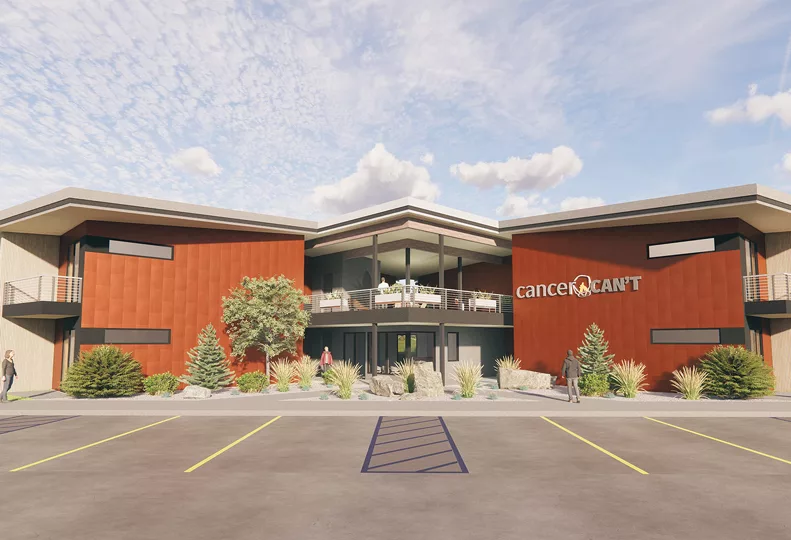Nonprofit envisions 20-unit lodge for cancer patients
Model for Cancer Can't designed to subsidize patient accommodations

A lodging facility for cancer patients undergoing treatment is envisioned to rise near the Kendall Yards neighborhood and operate on a self-sustaining model.
| SOK Design StudioSpokane-based nonprofit Cancer Can't is raising funds for a $4.6 million lodging facility for adult cancer patients who need to travel to Spokane to receive oncology treatment, says Becky Van Keulen, co-founder and board president at Cancer Can't.
Plans call for construction of 20 one-bedroom, Americans with Disabilities Act-compliant units in four, two-story structures to be located on the 1400 block of West Mallon Avenue, north of the Kendall Yards neighborhood.
Design plans created by Spokane-based Sayler, Owens, Kerr Inc., which does business as SOK Design Studio, call for the construction of the four buildings connected under one roof system, Van Keulen says.
Each unit will have about 635 square feet of living space, an open kitchen, a washer and dryer, and a private balcony. Additionally, flexible space in the living rooms can be converted into a separate sleeping area.
Though not a second bedroom, incorporating another sleeping area into the unit's design will provide a separate place for patients to rest and recover from treatment while caregivers or family members are nearby, but not in the same room, she says.
An information center also is planned in the facility.
Van Keulen says 1 in 2 men and 1 in 3 women will get a cancer diagnosis in their lifetime.
"If (cancer) hasn't touched you personally yet, it's going to," she says.
Permitting is expected later this year, followed by construction throughout 2025. Ideally, the center will open and begin accepting patients in 2026, Van Keulen says.
"We're still fine-tuning the design, but overall, it's more of a modern look," she says.
A general contractor for the project hasn't been selected yet.
Spokane-based SRM Development LLC is helping Cancer Can't with a feasibility study to address how the property will generate revenue for the Cancer Can't mission, she says. The nonprofit's goal is to create a self-sustaining property that offers accommodations to cancer patients for free, supported by long-term and corporate rentals at the site.
"What's really unique about this project is the business model," Van Keulen asserts. "We'll be able to produce some short-term rental income from those units when they're available."
She adds, "Oftentimes, patients want to go home on the weekends, and that opens up those units for us to use."
Short-term rentals would provide a safe place to recover for some Spokane-area hospital patients who are considered difficult to discharge due to compromised immune systems.
"If you're a transplant patient, you can't be so far away from the hospital, but because there's often nowhere to stay, they have to (remain) in the hospital," she explains.
Cancer Can't has committed about $1 million toward the capital campaign, which continues earning support since it launched in September, she says.
Private funding so far includes $100,000 each from the Kalispel Tribe of Indians' Northern Quest Resort & Casino and Summit Cancer Centers. Greater Spokane Incorporated has selected the lodging facility as one of the capital projects it will support through community advocacy and will help Cancer Can't navigate state funding requests, she says.
Additional funding for the facility is anticipated to be approved this spring for two public grants worth a combined $2.5 million. A naming opportunity also is available to support the project.
"Private funding (will) hopefully close the gap toward the end," Van Keulen says.
The idea for a permanent structure to house cancer patients came from a growing demand for accommodations, especially those who are traveling here from rural areas.
"You get people who are driving sometimes two to three hours to get treatment," she says. "Sometimes those people choose not to do treatment at all (due to) the cost of driving and staying at a hotel, a lot of which isn't covered by insurance. So it's a huge financial burden."
The organization's 2024 lodging budget to help pay for hotel accommodations for cancer patients is $40,000. Even with a medical discount, Cancer Can't spends about $100 a night per patient it helps and has to limit the number of nights it can sponsor to about eight nights per patient.
For example, a rural patient who travels to Spokane for radiation treatment typically would need to stay in the city for five nights a week for six weeks, which adds up to about $3,900 on top of medical expenses, she says.
"That's not to mention how many times they may have to come back," adds Van Keulen.
Cancer Can't also runs a transportation program for patients who need help getting to and from treatment. Once the facility is operational, Cancer Can't will have much of the infrastructure and resources already in place to get them to the care they need, Van Keulen says.
"If they can make it here and have that housing, (patients can) just worry about getting better instead of worrying how to pay for it."
Project updates:
*Oakbridge LLC, of San Diego, is planning a high-density townhome-style project in Kendall Yards, about a half-mile southwest of the Cancer Can't property, according to permit information currently under review by the city of Spokane.
Site plans for the 14-unit residential project show one 5,000-square-foot, six-unit building sandwiched between two four-unit, 3,600-square-foot buildings on the northeast corner of West Bridge Avenue and North Oak Street, west of Uprise Brewing Co..
The project is valued at $4 million, permit information shows.
A representative of Oakbridge couldn't be reached immediately for comment.
Trek Architecture, of Spokane, designed the project, and the Spokane office of DCI Engineers is providing engineering services.


_c.webp?t=1763626051)
_web.webp?t=1764835652)

